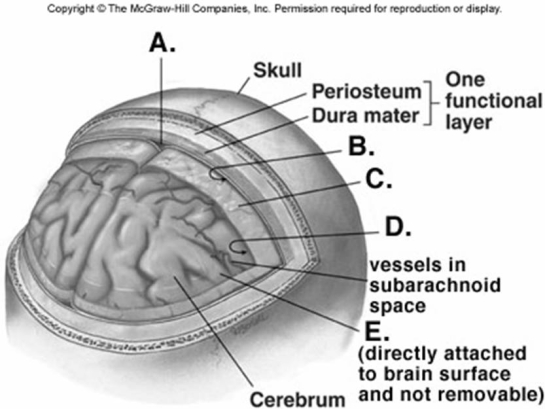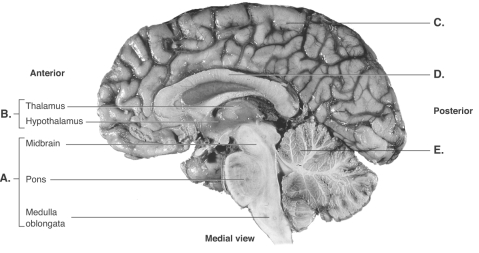A) visceral organs.
B) taste receptors of the tongue.
C) limbic system.
D) the prefrontal cortex of the cerebrum.
E) All of these choices are correct.
G) C) and E)
Correct Answer

verified
Correct Answer
verified
Multiple Choice
The interthalamic adhesion connects the two portions of the
A) thalamus.
B) epithalamus.
C) hypothalamus.
D) subthalamus.
E) corpus callosum.
G) A) and E)
Correct Answer

verified
Correct Answer
verified
Multiple Choice
Which two portions of the brain are involved in controlling respiration?
A) pons, hypothalamus
B) cerebrum, hypothalamus
C) pons, medulla oblongata
D) medulla oblongata, cerebral peduncles
E) pons, thalamus
G) C) and D)
Correct Answer

verified
Correct Answer
verified
Multiple Choice
Cerebrospinal fluid fills the
A) subarachnoid space.
B) subdural space.
C) dural sinuses.
D) epidural space.
E) None of these choices is correct.
G) C) and D)
Correct Answer

verified
Correct Answer
verified
Multiple Choice
 -What does "D" represent on the diagram of the skull and brain?
-What does "D" represent on the diagram of the skull and brain?
A) subarachnoid space
B) dural venous sinus
C) pia mater
D) arachnoid mater
E) subdural space
G) C) and D)
Correct Answer

verified
Correct Answer
verified
Multiple Choice
 -This is a midsagittal section of the right half of the brain. What does "B" represent?
-This is a midsagittal section of the right half of the brain. What does "B" represent?
A) cerebrum
B) cerebellum
C) corpus callosum
D) diencephalon
E) brainstem
G) A) and D)
Correct Answer

verified
Correct Answer
verified
Multiple Choice
When you lick frosting off a knife with the tip of your tongue and find the frosting has an orange flavor to it, which cranial nerve is being used to determine the taste of the frosting?
A) facial
B) trigeminal
C) hypoglossal
D) glossopharyngeal
E) abducens
G) C) and D)
Correct Answer

verified
Correct Answer
verified
Multiple Choice
Sixteen year-old Jake is diagnosed with hydrocephaly. What will this do if left untreated?
A) The brain will shrink and shrivel.
B) The excess fluid will exert pressure on his brain.
C) The cerebral cortex will absorb the excess fluid and swell.
D) Tthe choroid plexus will enlarge.
E) The arachnoid granulations will halt their function.
G) A) and E)
Correct Answer

verified
Correct Answer
verified
Multiple Choice
Which of the following activities is NOT associated with the cerebrum?
A) interpreting smell and taste
B) controlling the autonomic nervous system
C) initiating voluntary movements
D) making moral judgments
E) writing poetry
G) B) and E)
Correct Answer

verified
Correct Answer
verified
Multiple Choice
Which of the following basal nuclei is located in the cerebrum?
A) subthalamic nucleus
B) red nucleus
C) caudate nucleus
D) substantia nigra
E) habenular nuclei
G) A) and D)
Correct Answer

verified
Correct Answer
verified
Multiple Choice
Which of the following cranial nerves has a parasympathetic component?
A) facial
B) trochlear
C) trigeminal
D) hypoglossal
E) accessory
G) C) and D)
Correct Answer

verified
Correct Answer
verified
Multiple Choice
A lesion in the cerebral peduncles might affect
A) hearing.
B) movement.
C) sight.
D) heart rate.
E) taste.
G) C) and D)
Correct Answer

verified
Correct Answer
verified
Multiple Choice
Ptosis (drooping of the upper eyelid) of the left eye would be caused by damage to the
A) facial nerve.
B) abducens nerve.
C) trochlear nerve.
D) oculomotor nerve.
E) optic nerve.
G) D) and E)
Correct Answer

verified
Correct Answer
verified
Multiple Choice
A bird hits the windshield of your car, and you reflexively duck and close your eyes. Which of the following is responsible for this action?
A) medulla
B) superior colliculi
C) reticular formation
D) thalamus
E) cerebellum
G) B) and C)
Correct Answer

verified
Correct Answer
verified
Multiple Choice
The nucleus for the facial nerve (cranial nerve VII) is located in the
A) pons.
B) medulla.
C) mesencephalon.
D) cerebrum.
E) cerebellum.
G) A) and E)
Correct Answer

verified
Correct Answer
verified
Multiple Choice
Which nerve has branches that extend to the thoracic and abdominal viscera?
A) facial nerve
B) vagus nerve
C) trigeminal nerve
D) glossopharyngeal nerve
E) accessory nerve
G) A) and B)
Correct Answer

verified
Correct Answer
verified
Multiple Choice
The blockage of CSF inside the brain is a condition called
A) internal hydrocephalus.
B) ventricular hydrocephalus.
C) external hydrocephalus.
D) internal hematoma.
F) All of the above
Correct Answer

verified
Correct Answer
verified
Multiple Choice
The primary somatic sensory or general sensory area is located in
A) the postcentral gyrus.
B) the precentral gyrus.
C) the prefrontal gyrus.
D) Wernicke's gyrus.
E) the prefrontal cortex.
G) C) and E)
Correct Answer

verified
Correct Answer
verified
Multiple Choice
Which of the following arteries supply blood to the brain?
A) external carotid arteries
B) internal carotid arteries
C) vertebral arteries
D) Both the internal carotid arteries and the vertebral arteries.
F) All of the above
Correct Answer

verified
Correct Answer
verified
Multiple Choice
Match the function with the correct lobe of the brain. -frontal lobe
A) important in voluntary motor function
B) fifth lobe of the brain
C) plays an important role in memory
D) reception and integration of visual input
E) reception of most sensory input
G) All of the above
Correct Answer

verified
Correct Answer
verified
Showing 121 - 140 of 158
Related Exams